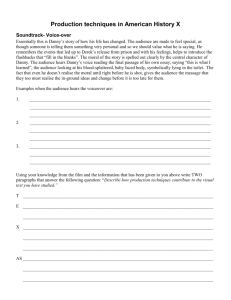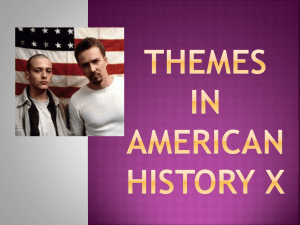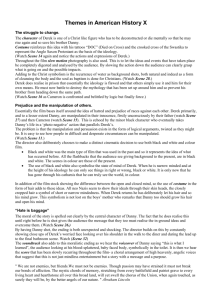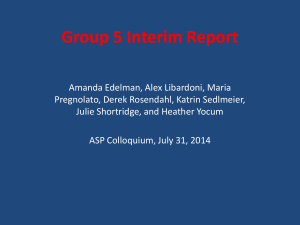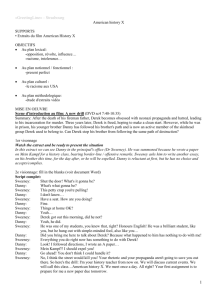AMERICAN HISTORY X
advertisement
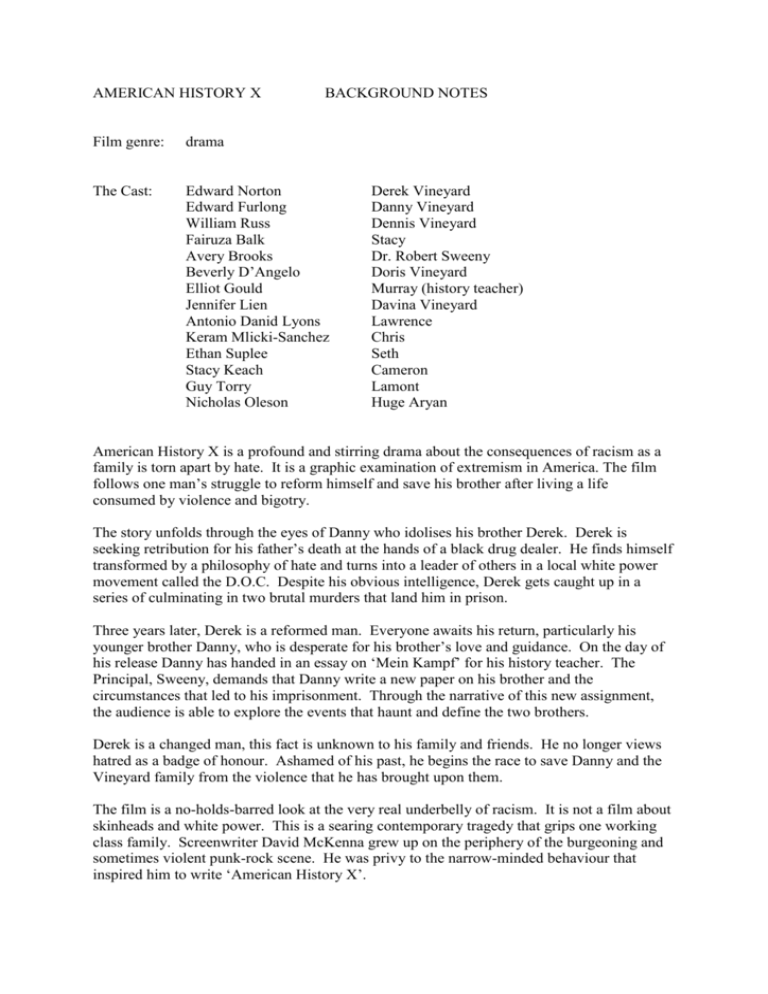
AMERICAN HISTORY X BACKGROUND NOTES Film genre: drama The Cast: Edward Norton Edward Furlong William Russ Fairuza Balk Avery Brooks Beverly D’Angelo Elliot Gould Jennifer Lien Antonio Danid Lyons Keram Mlicki-Sanchez Ethan Suplee Stacy Keach Guy Torry Nicholas Oleson Derek Vineyard Danny Vineyard Dennis Vineyard Stacy Dr. Robert Sweeny Doris Vineyard Murray (history teacher) Davina Vineyard Lawrence Chris Seth Cameron Lamont Huge Aryan American History X is a profound and stirring drama about the consequences of racism as a family is torn apart by hate. It is a graphic examination of extremism in America. The film follows one man’s struggle to reform himself and save his brother after living a life consumed by violence and bigotry. The story unfolds through the eyes of Danny who idolises his brother Derek. Derek is seeking retribution for his father’s death at the hands of a black drug dealer. He finds himself transformed by a philosophy of hate and turns into a leader of others in a local white power movement called the D.O.C. Despite his obvious intelligence, Derek gets caught up in a series of culminating in two brutal murders that land him in prison. Three years later, Derek is a reformed man. Everyone awaits his return, particularly his younger brother Danny, who is desperate for his brother’s love and guidance. On the day of his release Danny has handed in an essay on ‘Mein Kampf’ for his history teacher. The Principal, Sweeny, demands that Danny write a new paper on his brother and the circumstances that led to his imprisonment. Through the narrative of this new assignment, the audience is able to explore the events that haunt and define the two brothers. Derek is a changed man, this fact is unknown to his family and friends. He no longer views hatred as a badge of honour. Ashamed of his past, he begins the race to save Danny and the Vineyard family from the violence that he has brought upon them. The film is a no-holds-barred look at the very real underbelly of racism. It is not a film about skinheads and white power. This is a searing contemporary tragedy that grips one working class family. Screenwriter David McKenna grew up on the periphery of the burgeoning and sometimes violent punk-rock scene. He was privy to the narrow-minded behaviour that inspired him to write ‘American History X’. Critics notes – Roger Ebert (Chicago-Sun Times) The good points: In the telling of Danny and Derek’s stories, them film employs the language of racism – the gutter variety and more sophisticated variations. The film is always interesting and sometimes compelling The scariest and most convincing scenes are the ones in which we see the skinheads bonding. They’re led by Derek’s brilliant speech making and fuelled by drugs, beer, tattoos, heavy metal and the need all insecure people feel to belong to a movement greater than themselves. In the immediacy of its moments, in the photography that makes Venice look like a training ground for the apocalypse, and in the strength of the performances, it is a wellmade film. This is a good and powerful film. The points needed improving: In trying to resolve the events of four years in one day, it leaves its shortcuts showing. The scene of Derek’s father’s dinner table conversation; his father tutors him in racism, feels like tacked-on motivation, and the movie never convincingly charts Derek’s path to race hatred. I kept hoping it (the film) would be more – that it would lift off and fly, as it might have with a director like Oliver Stone, Martin Scorsese or Spike Lee. But it never quite does. It’s underlying structure is too apparent, and there are scenes where we sense the movie hurrying to touch its bases. One crucially underdeveloped area is Derek’s prison experience. With a swastika tattooed on his chest, he fits in at first with the white power faction, but is disillusioned to find that all the major groups in the prison (black, Hispanics, white) have a working agreement; that’s too much cooperation for him. Fine, but is it that, or a crucial basketball game, that gets him into trouble? Not clear. There’s a strange imbalance in Derek’s conversations with Lamont in the laundry. The movie’s right-wing ideas are clearly articulated by Derek in forceful rhetoric, but are never answered except in weak liberal mumbles (by a Jewish teacher). And then the black laundry worker’s big speech is not about ideas or feelings, but about sex and how much he misses it. There is no effective spokesman for what we might still hopefully describe as American ideals. Well, maybe Derek wouldn’t find one in his circles. What we get, finally, is a series of well-drawn out sketches and powerful scenes, in search of an organising principle. The movie needs sweep where it only has plot. And Norton, as effective as he is, comes across more as a bright kid with bad ideas than as a racist burning with hate.

